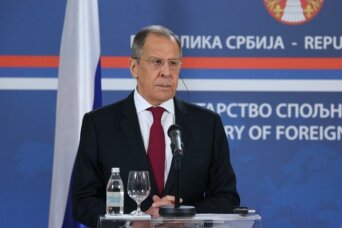- About
- Topics
- Picks
- Audio
- Story
- In-Depth
- Opinion
- News
- Donate
-
Signup for our newsletterOur Editors' Best Picks.Send
Read, Debate: Engage.
| topic: | Good Governance |
|---|---|
| located: | Bosnia and Herzegovina, Russia, Serbia, Croatia |
| editor: | Katarina Panić |
Russian Foreign Minister Sergei Lavrov visited three Western Balkan countries this week. Unlike Serbia and Croatia, in Bosnia and Herzegovina, at least three things went wrong.
Firstly, Bosniak and Croat members of the tripartite state presidency refused to meet him, despite a carefully and long-planned protocol. Šefik Džaferović and Željko Komšić wanted to show their disapproval on what happened the day before. Namely, Lavrov met Serb officials in Republika Srpska – one of the three administrative units in the country – and afterwards he and Serb member of presidency Milorad Dodik called for the closure of the Office of the High Representative – the international body that oversees the civilian implementation of the Dayton Peace Agreement.
"The OHR's departure from Bosnia is advocated by forces that constantly talk about secession (of Republika Srpska)," Džaferović told media.
"The lack of the state flag during the meeting with Dodik is no mistake. We see this as a form of disrespect and denial of our country's institutions to which came in an official visit," said Komšić.
Lavrov said he doesn't believe the incident is essential for relations between Russia and Bosnia.
"I believe that the politicians who made that decision are not independent, they work under someone's instructions," he told the media during his subsequent visit to Serbia.
Secondly, the day after minister Lavrov left the country, Russia's Gazprom Export informed the buyer in Sarajevo that it will halve the gas delivery to Bosnia as of tomorrow "due to technical issues". By the end of the day, the new announcement arrived – that is not going to happen. However, the message has been delivered: be careful who you play with.
Thirdly, Dodik presented to Lavrov a 300-year-old gilded Orthodox icon. The media revealed its wax seal stamp indicates it was brought from Luhansk, an east Ukrainian city controlled by pro-Russian forces for six years. Now, Ukraine demands information about how their heritage ended up in Bosnia, while Bosnia's prosecution yesterday launched an investigation over a diplomatic scandal.
The story highlighted once again that the top players in the world are keen to keep and to strength their positions even in countries as small as Bosnia. The competitors are still as big as the EU, US, NATO, China and Turkey.
Image © The Ministry of Foreign Affairs of the Russian Federation

